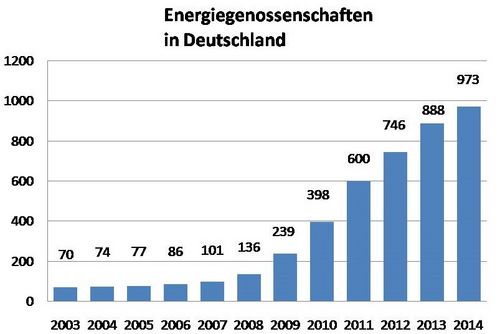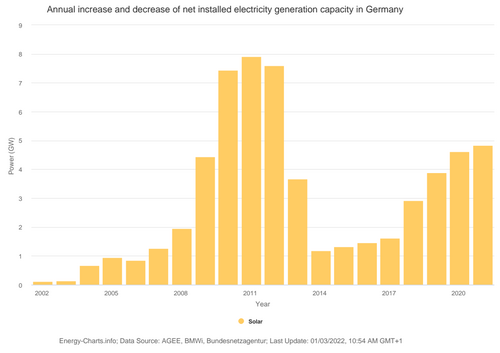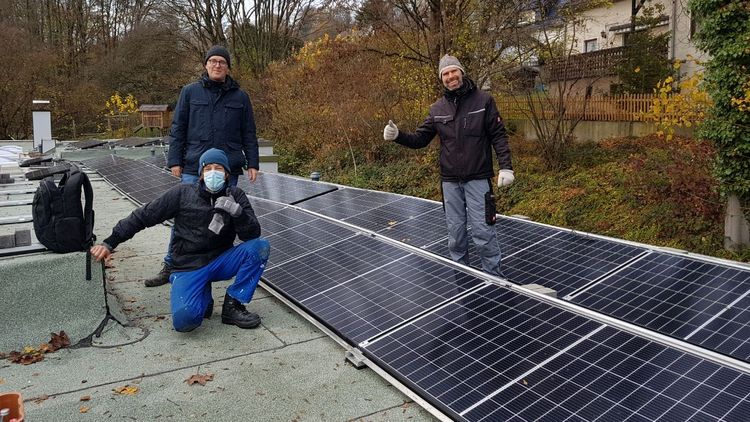From the attempts to take over the local electricity grid to a small sustainable energy company
Last September, the Oldenburg Energy Cooperative turned 10 which was celebrated in the small club Polyester (Am Stadtmuseum 15, Oldenburg) which some PPRE Alumnis might still know as a good location to have one or other alcoholic beverage pre-corona[i]. The party happened right after the yearly cooperative assembly which gave another reason for celebration: In 2020, the Olegeno had a positive yearly result for the first time ever with a very good outlook for 2021. To better understand why I am highlighting this fact, it makes sense to look at the eventful history of the Olegeno.
It all started in 2011 when a small group of people from around the “Oldenburg energy council” (an association of volunteers that worked on energy-related topics founded in 1982) decided to participate in the bidding process for the concession of the Oldenburg distribution grid. For some background, in Germany the area on which the grids are built belong to the municipality. The right to use this public space is then granted to a distribution grid operator via a public bidding process. In Oldenburg, the old concession contract was running out in 2013, thus, the Olegeno was founded 2 years before as a vehicle for participating in this process. This idea was not unique in Germany at this time, but embedded in a general spirit of recommunalization of public goods in opposition to the neoliberal privatization wave of the 90s. Fruitful outcomes of this movement are the city grids of Hamburg which was bought back from Vattenfall after a public referendum in 2013 [ii] [iii] and of Berlin as decided by Berlin’s city parliament in 2021[iv]. Another small example are the famous “energy rebels” of the Elekrizitätswerke Schönau (EWS), a cooperative that took over control of the local distribution grid in the South of Germany and is now a renowned green energy supplier.
Despite the good examples in the rest of Germany, the Olegeno did not win the concession for the Oldenburg grid. After a close recommendation against the Olegeno in the evaluation process of an independent consulting company, the city council voted in favor of the continuation of the old grid operator, the “EWE Netz” (for more info on the concession process read https://www.olegeno.de/ueber-uns/konzessionsverfahren/chronologie.html).

Figure 1: Number of Energy Cooperatives in Germany (https://de.wikipedia.org/wiki/Bürgerenergiegenossenschaft)
With the prime objective suddenly evaporated, the Olegeno went into a reflection process where three new business areas were singled out: The sale of green electricity to households and small businesses, the construction of PV plants and a contracting model of building heat renovations. Also in those fields, the Olegeno had a plethora of other exemplary energy cooperatives to copy from. Until the year 2014, Germany counted until 973 energy cooperatives which were largely founded between 2008 and 2011 (see Figure 1) due to the very simple and reliably profitable nature of the German Renewable Energy Act (EEG) which guaranteed 20 years of stable feed-in tariffs and was thus easy to handle for small groups of volunteers.
Most cooperatives were active in the field of small and medium-sized PV farms, whereas some even invested into small wind farms. However, with the reform 1 and 2 of the EEG in 2012 by the conservative-liberal government of the CDU/CSU and the FDP, both, the rapid development of PV capacity and the easy-going philosophy of the EEG came to an abrupt halt, which is shown in Figure 2. The added yearly PV capacity increased steadily until the year 2011. The year 2013 then saw an immense drop by 50% of added capacity (ironically called the “Altmaier dent” after Peter Altmaier, the Minister of Economics of that time) until it slowly started to recover until the year 2019 with an installation of 3.78GW. According to a recent study of the Fraunhofer ISE from 2020 [v], 10 to 15 GW of PV have to be installed per annum in order to reach the goal of 65% CO2 emission reduction until 2030. I let that sink in for a while.

Figure 2: Added yearly PV capacity Fraunhofer ISE (energy-charts.info)
Needless to say, the Olegeno did not exactly start off with the best timing in bringing a people-driven energy transition to Oldenburg. The years between 2014 and 2019 were dominated by dull excel sheet exercises with PV project after PV project that could not be invested in due to too high economic risks. In those project attempts, any extra costs, that had to be born by the Olegeno, such as the digging of a cable trench or the renewal of the grid-connection of a house, quickly rendered the calculations unprofitable as the feed-in tariff was so small. For example: If you build a 17kWp PV plant now, each kWh injected to the grid gets you a tiny 6.25ct from the grid operator. Therefore, the so-called “project graveyard” grew until the city of Oldenburg offered a more benevolent rooftop of the city’s new fire station for an Olegeno PV plant in 2019. This plant that was entirely feeding its electricity to the grid, was then succeeded by a rather innovative second plant of 40kWp which sells its electricity to the 44 tenants of the corresponding apartment building, adhering to the so-called “solar electricity for tenants law” of 2017. This law was an unsuccessful attempt to let tenants participate in the German Energy Transition. Unsuccessful as it was only rarely exercised by anybody due to its manifold requirements upon the plant operator.
As opposed to the third business area of heat projects which never really got a hold within the Olegeno, the second area, the trade with Green electricity really took off and became a steady pillar of our small economy. Since 2015 the Olegeno is able to sell green electricity and since 2018 ecological natural gas due to its cooperation with the nationwide cooperative of the Bürgerwerke (www.buergerwerke.de/). This cooperative is again comprised of around 100 small energy cooperatives that decided to buy and sell electricity together in order to come up with the big up-front costs that are necessary to start up in the electricity business. Together they are able to buy green electricity and to pay an increasing number of employees. As of November 2021, the Olegeno is therefore able to sell energy to more than 600 households and companies.
The plans for the future of the Olegeno are quite enthusiastic: that all rooftops of Oldenburg are at some point shining black or blue with some beautiful PV modules, but the Olegeno is at a good starting point for two reasons: The newly elected city council with a green majority just decided that Oldenburg has to be carbon neutral by the year 2035. Additionally, the new federal government with the Greens involved promised in their coalition contract to be way more ambitious in reaching their climate targets. It is a safe bet that the market for Photovoltaics in Oldenburg and Germany will boom again and the Olegeno is entirely willing to help Oldenburg and Germany on their way to climate-neutrality ASAP.
By the way: the Olegeno staff is entirely comprised of volunteers of which some are and have been PPRE alumni. New ones always welcome! If you like our work and want to support the Oldenburg Energy transition:
- You can become a member of the cooperative by buying shares for 60€.
- Get your electricity from us via our website (http://www.olegeno.de/strom)
- Volunteer for us! (German language skills required)
Greetings from Oldenburg!
Jonas Stührenberg
[i] On a sidenote: The Polyester is located inside the building which was bought by the Polygenos cooperative to circumvent the tearing down of the very building.
[ii] https://de.wikipedia.org/wiki/Stromnetz_Hamburg
[iii] https://www.hk24.de/produktmarken/interessenvertretung/wirtschaft-politik/energiethemen/rekommunalisierung-der-energienetze-1155318
[iv] https://www.rbb24.de/wirtschaft/beitrag/2021/06/berlin-kauft-stromnetz-von-vattenfall-zurueck.html
[v] Fraunhofer ISE (2020): Wege zu einem klimaneutralen Energiesystem
www.ise.fraunhofer.de/content/dam/ise/de/documents/publications/studies/Fraunhofer-ISE-Studie-Wege-zu-einem-klimaneutralen-Energiesystem-Update-Zielverschaerfung.pdf


